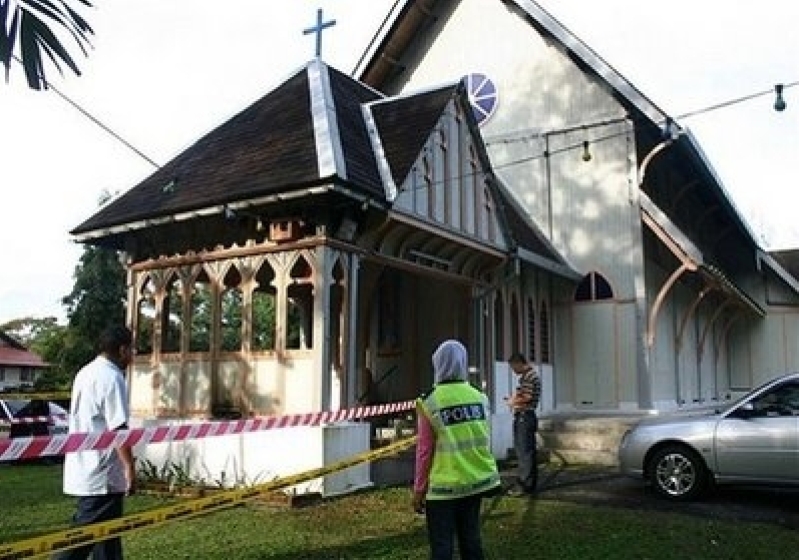
Three more churches in Malaysia were targets of arson Sunday and another was vandalized in the latest wave of attacks on the country’s Christian minority.
According to local reports, two of the latest attacks failed and the third – a Molotov cocktail that was thrown at the All Saints Church in Malaysia’s central Perak state – left only a mark on the wall.
The outer wall of the Malacca Baptist Church in southern Malacca state, meanwhile, was splashed with black paint.
One day earlier, two firebombs were thrown at the Good Shepherd Lutheran Church in the Petaling Jaya suburb, leaving marks but no damage.
On Friday, three churches in Malaysia were attacked with firebombs. To date, at least eight churches have been targeted by arsonists and vandals.
Despite the attacks, thousands of Christians across the predominantly Muslim country attended services and prayed for national unity and an end to the violence sparked by a court’s decision to lift a ban on the use of the word “Allah” by non-Muslims.
On Dec. 31, 2009, two years after a lawsuit was filed against the government over the “Allah” ban, High Court Judge Datuk Lau Bee Lan announced that the word “Allah” is not exclusive to Islam and that the government’s Home Ministry is “not empowered” to ban non-Muslims from using the word.
After the landmark ruling, Muslim activists were quick to mobilize, including the National Union of Malaysian Muslim Students, which urged the government to take the case to the Appeals Court, arguing that Christian missionaries using the word Allah could trick Muslims into leaving their faith.
Some even managed to hack into the website of the Roman Catholic Church’s weekly Malaysian publication, The Herald, which sparked the internationally-watched court battle.
In response, pastors in Malaysia Sunday urged congregants to continue “reaching out in friendship to all, including Muslims” and “keeping the peace in multi-religious Malaysia.”
Some churchgoers were also joined by a number of leaders from the Muslim community who attended services in a show of unity and peace.
Government and Muslim leaders have emphasized that acts of violence such as those witnessed Friday and the days afterward were not representative of Islam.
Prime Minister Najib Razak, who condemned the attacks, said the government would "take whatever steps it can to prevent such acts."
In an effort to repair ties, six Muslim NGOs have offered to work to help protect churches from further attacks.
According to the CIA World Factbook, 60.4 percent of Malaysia's 25.7 million people ascribe to Islam. Around 19.2 percent, meanwhile, is Buddhist, and 9.1 percent is Christian.
In general, Muslims enjoy special privileges in Malaysia as Islam is the dominant religion.







